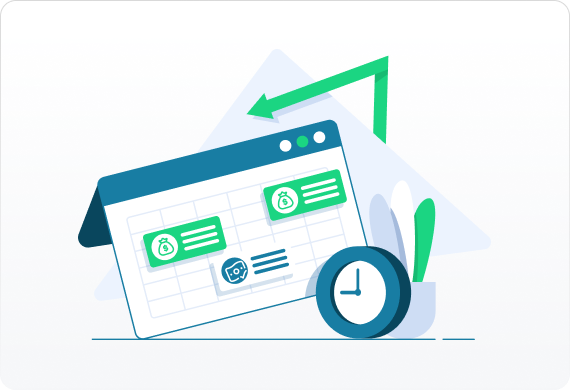Worried about rent coming due in a week? Don’t know how you’re going to pay your employees on Friday? Operating expenses are at the core of every business. They literally keep the doors open and the lights on.
But it’s not uncommon for small business owners to run into issues making these regular payments. Customers who don’t pay on time, or don’t pay an invoice in full, could put your budget out of balance. Without warning, you have a cash flow gap.
In these situations, you can pay your bills late – and incur fees and possibly lose key employees – or you can take out a business operating loan. A loan that covers working capital needs is often the best, and easiest, way to deal with unexpected cash flow emergencies. Before applying for a business operating loan, however, here’s what you need to know.

What Do I Need to Qualify?
Below is a list of the general requirements to get approved for business funding with our basic program.

How Do I Apply?
Applying has never been easier. You can either call our toll free number 24 hours 7 days a week at:
OR
Working capital loans have a shorter term, helping business owners who face temporary cash flow issues such as bills coming due before customers pay their invoices. If you only have a few days to raise funds for a large expense, you can apply for and receive funding for a working capital loan in as few as 24 hours.
To qualify for a working capital loan, you need a credit score above 650, your business must have minimum monthly revenues of $10,000, and you must have been in business for at least two months. Lenders offer working capital loans between $10,000 to $1 million. Repayment terms last between one to three years, but there’s no prepayment penalty if you want to pay the loan off early.
A fast business loan can be used to fund a smaller project or working capital needs that you anticipate to stretch over several months. Businesses with high seasonality may find this to be their best option during slow periods when in need for immediate capital.
Fast business loans require a minimum credit score of at least 600 and two years in business. Interest rates range from 9% to 45%. Your business must have minimum monthly revenues above $10,000, but you can borrow as little as $10,000 up to $750,000 with no prepayment penalties.
A fast business loan can be used to fund a smaller project or working capital needs that you anticipate to stretch over several months. Businesses with high seasonality may find this to be their best option during slow periods when in need for immediate capital.
Fast business loans require a minimum credit score of at least 600 and two years in business. Interest rates range from 9% to 45%. Your business must have minimum monthly revenues above $10,000, but you can borrow as little as $10,000 up to $750,000 with no prepayment penalties.
If you receive a large amount of credit card payments, look into applying for a merchant cash advance. When you take out a merchant cash advance you sell a percentage of your credit card receivables to the lender. They advance a sum of money based on past credit card sales, so when you apply you’ll need to provide your past few months’ credit card statements.
Merchant cash advances are easy to repay – the MCA provider deducts payments from your cash flow in dollars and cents. You don’t have to budget for a large, monthly lump-sum loan payment, and repayment aligns with your cash flows. If you have minimum monthly revenues of $8,000 which are primarily processed through credit cards, you can apply for a merchant cash advance with a credit score above 500.
Small business owners with poor credit can still take out a loan, though not at a bank. Apply with lenders who offer bad credit business loans. Alternative lenders extend credit to business owners with lower credit scores, though they will charge a higher interest rate than a bank. Interest rates range from 12% to 45%, reflecting the risk you pose to the lender.
If you have a credit score as low as 500, but your business has minimum monthly revenues of $8,000, you could still borrow. Repayment terms are anywhere from 2 to 18 months and there are no prepayment penalties.
When it’s time to borrow to meet operating capital needs, reach out to Shield Funding. We have over twelve years of experience working with small business owners. Call today to talk to one of our loan specialists.

Apply Directly to One Source!
Work with a direct lender and get a business loan as fast as the same day. Shield Funding offers competitive rates and terms on all it’s funding programs. Apply now with a trusted lender that has been helping business owners secure working capital for almost two decades.
Businesses incur various types of expenses in normal operations. Predictable, monthly operating expenses include:
These are expenses incurred in the daily running of your business, as compared to large capital expenditures or expansion plans. The money to cover these expenses is called working capital.
Working capital is the money you have available to keep your business’ doors open. It consists of cash, cash reserves, and other current assets. To calculate how much working capital you have, take current assets on the Balance Sheet and subtract current liabilities.
The working capital ratio is current assets divided by current liabilities. It’s a measure of liquidity and used to gauge a business’ ability to meet current obligations. What’s considered a “good” working capital ratio varies by industry, but typically a ratio of 1.5 to 2 is a good sign. Anything less than this indicates you may struggle to pay your expenses.
If your working capital ratio has you worried, it’s time to look into a business operating loan.
Business operating loans are short-term loans designed for emergencies. Lenders offer these loans to small business owners who might have just realized they don’t have enough cash to cover payroll on Friday, or that rent is due and they’re a bit short. If a customer hasn’t paid on time, or unexpected expenses came up, and now it’s doubtful you can pay your bills, this is the loan for you.
Lenders extend a business operating loans on the basis of your credit score, time in business, and minimum monthly revenues. They perform much less underwriting than a traditional bank, which allows them to fund the loan quickly. But, because of this, the loan is riskier.
To compensate for this risk, a lender will charge a higher interest rate on a business operating loan than on a traditional bank loan. Expect to pay between 12% to 45%, though with no prepayment penalty. While there is a price for convenience, working capital lenders can approve and fund a loan in under 24 hours.
Other than paying your bills, what are the benefits to working capital loans?
Past success sets your business up for future success. With the funds available to cover your operating expenses, you can focus on growing your business. What’s more, because no late payments will show up on a credit report, you maintain your credit in good standing and can borrow at better rates in the future.
Other forms of credit may require that you pledge business assets as collateral. If you defaulted on the loan, the lender would seize those assets. Selling an equity stake is another way to raise funds, but you’re giving up ownership in exchange for capital.
A working capital loan gives you the money you need to keep going, without sacrificing equity or putting your business at risk.
While you can take out a working capital loan intending to pay rent with it, what if payday arrives sooner? Lenders don’t monitor or track how you spend the money, and place no restrictions on it. You’re free to use the funds as is best for your business, giving you financial flexibility.
Once you’ve determined that a loan is your best option, ask yourself these questions to make sure that borrowing is a success.
Other than paying your bills, what are the benefits to working capital loans?
Look at your budget before borrowing – once customers have paid, or cash receipts are in, can you afford to repay the loan? Have a plan for repayment, and ensure that you can repay the loan, before borrowing. Failing to make payments and defaulting on a loan will hurt your credit score and lead to legal action.
It’s important to take out a loan that covers all of your funding needs. If you only apply for enough money to cover rent, but also can’t pay the electric bill, you’ll have to take out another loan. This is called loan stacking, and it can get you into a debt cycle that’s difficult to break.
Traditional lenders will only work with borrowers who have several years of business history. If you’ve only been in business a few short months, work with an alternative lender for your funding needs.
If you have a poor credit score it will be hard to borrow at a bank. Traditional lenders prefer working with borrowers who have scores of 720 and above. Any missed payments in the past, defaults, or bankruptcies will have lowered your score.
Small business owners with scores below 720 will find their best option for getting a loan approved at an alternative lender.
Lenders offer different repayment terms. Banks prefer loans of two to five years, or longer. Their costs to fund a loan are the same if it’s a short-term or long-term loan, but they make more money on a longer term. This won’t work if you only need a few months funding.
Alternative lenders offer loans with repayment terms of months to years, giving you more flexibility. These terms often work better for a borrower who only needs capital for a few months.

